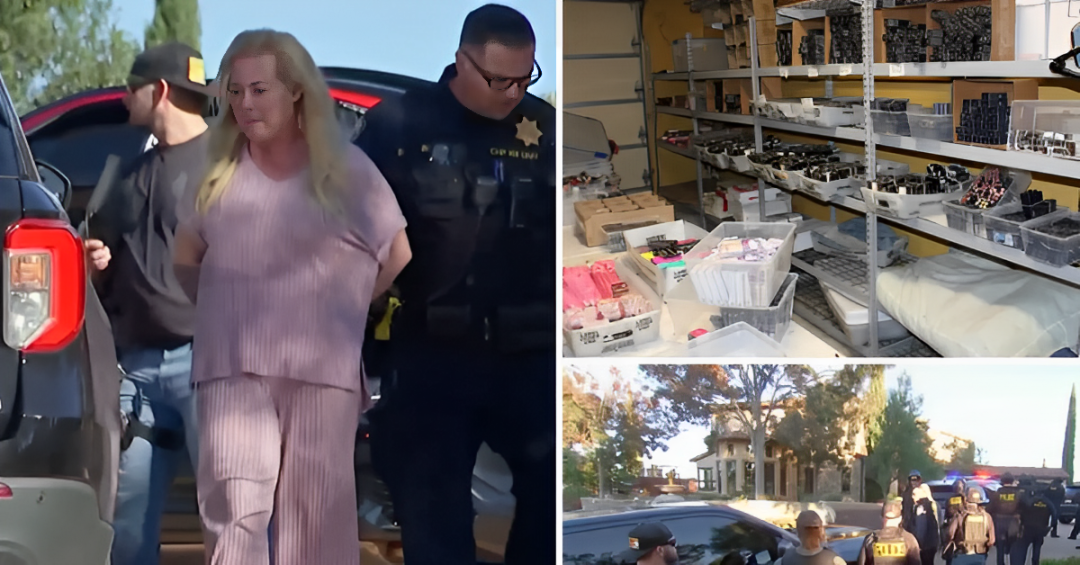In a significant ruling, Michelle Mack, the California woman who pleaded guilty to running an extensive organized retail crime ring, has been sentenced to pay millions in restitution to Ulta Beauty, Sephora, and other retailers as part of her criminal sentence. The theft operation, which involved stealing beauty products worth millions from popular retailers to resell them on Amazon, has now led to Mack’s financial reckoning.
Mack, 54, was arrested in December 2023 just outside of San Diego and began serving a five-year prison sentence on January 9. As part of a plea agreement, she was ordered to pay $3 million in restitution to the victims of her crime ring. This amount is to be distributed among retailers like Ulta Beauty and Sephora, who were the primary targets of her operations.
A Pricey Deal with the Law
Along with the restitution, Mack forfeited her 4,500-square-foot mansion located in Bonsall, California. The property, which she had purchased for $2.29 million in 2021, was sold for $2.35 million in December. According to property records, the proceeds from the sale were used to cover any outstanding debts on the property, with the remaining funds allocated to the restitution.
The repayment will be a slow process. While the sale of the mansion covers a portion of the owed restitution, Mack and her husband, Kenneth Mack, 60, have agreed to pay the remainder over time. California Attorney General Rob Bonta’s office emphasized that the repayment will continue in a gradual manner. However, it remains unclear how the remaining funds from the mansion’s sale will be split between the victims or how much each retailer will receive.
The Big Picture on Retail Crime
The stolen beauty products, which amounted to an estimated $8 million, were mostly taken from Ulta Beauty, though Sephora and other retailers were also targeted. Despite the scale of the theft, the restitution order of $3 million represents only a small fraction of the financial losses suffered by these major retailers, especially considering the annual revenue generated by brands like Ulta.
However, Ulta Beauty expressed its satisfaction with the cooperation from law enforcement during the investigation. “This case demonstrates that through close partnerships between retailers, law enforcement and prosecutors, as well as legislative support, we can make a meaningful impact on organized retail crime,” said Dan Petrousek, senior vice president of loss prevention at Ulta Beauty.
While Sephora did not comment on the case, industry experts pointed out that restitution is becoming increasingly common for retailers affected by organized theft rings. David Johnston, vice president of asset protection at the National Retail Federation, mentioned that the scale of these crimes has been growing rapidly in the last few years. He highlighted that the restitution amounts in recent years have started reaching millions, reflecting the heightened severity of these criminal activities.
The Complexities of Retail Theft Rings
Mack was not accused of stealing the products herself. Instead, law enforcement revealed that she operated a large network of individuals, primarily recruiting young women, to steal from the stores. Once the products were taken, Mack would resell them on her Amazon storefront at discounted prices. The operation spanned multiple states and exploited the online marketplace system to sell stolen goods, a method that has gained attention in recent years for its efficiency.
California Highway Patrol led the investigation, which received national coverage due to the sophisticated methods employed by Mack and her criminal network. The case illustrated how organized retail crime rings have adapted to the rise of online shopping platforms to move stolen goods across state lines and even nationally.
A Long Road to Full Restitution
While the restitution order is a step towards justice, experts have pointed out that it may not fully compensate the retailers for their losses. Johnston mentioned that restitution, while a vital part of the legal process, is rarely sufficient to cover the total amount of damage done by large-scale retail theft. Additionally, he explained that the process of receiving restitution is not always straightforward, as it depends on the ability to collect the payments from the offender, especially when dealing with organized crime groups.
It is also important to note that Mack’s sentence was delayed until January 2024 to allow her to care for her children while her husband served his own sentence. This extension was granted by the court to ensure that the family’s responsibilities were taken into account during the judicial process.
The Bigger Picture of Organized Retail Crime
The Mack case serves as a reminder of the growing threat of organized retail crime and its impact on businesses across the nation. With the rise of online marketplaces, these criminal networks are becoming more adept at exploiting the system, and retailers are facing increased losses. Law enforcement and prosecutors are stepping up efforts to combat these types of crimes, but the issue remains complex, and the fight against retail theft is ongoing.
Disclaimer: This article has been meticulously fact-checked by our team to ensure accuracy and uphold transparency. We strive to deliver trustworthy and dependable content to our readers.

